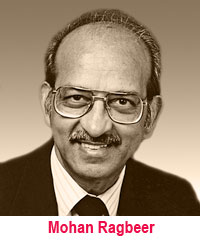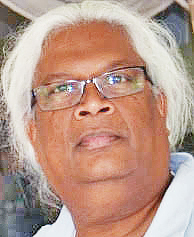Opinions
Bloody Hands

Two trouble spots today, Kashmir and Hong Kong owe their tinderbox status to past British policy when the Empire held supreme power, like USA today: top dog, snarling at everyone, hoarding imperial loot in its manger. Leaving India was regretted, not because Britain liked Indians – Churchill despised them; but they coveted India’s wealth, had enjoyed 200 years of rapacity, 100 of freedom to dictate its education, economy and government, change its history to suit imperial aims, and pillage at will. Lord Elgin saw the Empire collapsing if India were lost!
They brain-washed Indians, dividing them in every imaginable way: religion, language, worth, ethnicity, residence, education, occupation, cuisine, caste, skin colour, and any other caprice of the moment.
Lord Linlithgow, third-to-last viceroy, fomented separation, torpedoed united independence, and secured means to maintain British benefits by courting one major group. Religion chose itself; it was not an objective of Gandhi’s Wardha scheme, so Muslims demanded their own state.
India and Pakistan’s emergence, 72 years ago this month (15/8), left Kashmir in limbo, long coveted by the British as a place of retirement; Maharajah Hari Singh had anticipated its recognition as independent J&K. But Attlee reneged, and briefly, Kashmir had no international legal status; its army comprised Muslims, Sikhs, Hindus, and others.
Spurred by Major William Brown, the British officer commanding northern Kashmir troops, Muslim soldiers massacred Sikhs and other comrades, seized northern Kashmir, in Pakistan’s name, which promptly began advancing on Srinagar on Oct 22nd 1947, as Hari Singh asked India for help. Nehru, a Kashmiri by ancestry, cared little whether Pakistan took Kashmir, but had to assist after the Maharajah acceded to India. By then, the Pakistan invaders were at Baramulla, a day from taking Srinagar, but had to stop to complete an essential victors’ routine, the rape and enslavement of women! Famously they cabled HQ: “…all women raped!” The delay gave time to complete the accession, and arrange bill 370, which conferred a special self-governing status. The Indian army repelled the invaders, but Nehru called a halt just when his army had Pakistan’s fleeing to the border, an unforgivable error. Rather than discipline Major Smith, the British honoured him. Kashmiri Muslims were Ahmadiyyas, Sufis and other peace-lovers, exiled in the last three decades by terrorists, Wahhabis, funded by Saudi Arabia and trained by Pakistan’s ISI. The exiles are probably your neighbour somewhere in Canada.
In the last thirty years, terrorism has forced non-Muslim Kashmiris to become refugees, which the INC ignored. Modi’s actions are long overdue; Western media toe the Saudi Muslim line by calling India’s action pro-Hindu, ignoring the fact that 193M Muslims live in relative peace in India; many support Modi, while Pakistan continues to harass Hindus, and Western media continue their anti-India bias.
The brouhaha in Hong Kong over a proposed Extradition Bill has come to Canada. "This extradition bill, if enacted, is going to allow China to arbitrarily arrest anybody who is working, travelling, living or even in transit via Hong Kong" – Gloria Fung, President of Canada-Hong Kong Link told CBC News in June.
Ms Fung seems misled! That’s not how “Extradition” normally works; it legally provides a basis for one Government to petition another to release someone wanted for a crime in the petitioner’s country. It doesn’t allow one country to arrest someone in the other. The HK law stemmed from a Taiwanese request to release a man wanted for killing his pregnant girl-friend, and fleeing to HK! Officially, only HK courts can decide to grant extradition requests. HK has extradition treaties with 20 countries, including Canada, UK, USA, Singapore and Philippines, and legal “assistance” with 32, but not China, its parent body!
A legacy of British rule; after the 1840s Opium Wars, Britain forced China to import opium, addicting over 120 million, and kept them supplied from the enforced bases in HK and Shanghai’s Bund. Opium was hugely profitable to Britain, and helped found today’s huge shipping, merchandising and property conglomerates, and a thriving Mafia.
The protesters of the now-suspended extradition bill have expanded their demands, and reek of US/UK guidance, with identical methodology to the Guiana unrest of 1961-63 that destabilised and ruined that poor country. In videos of numerous clashes, I see stamps of the professional terrorist; the question arises: who bank-rolls this very expensive mayhem, much of which is beyond the scope of students, however rich or precocious?
US officers have been uncovered meeting with protest leaders, calling complainants, Beijing, “thugs”, while admitting meeting with political groups “all over the world”, confirming US role in much of global unrest! And where the US is today, the UK is close behind! How would the US react to Chinese interference in Puerto Rico?
Lord Linlithgow, third-to-last viceroy, fomented separation, torpedoed united independence, and secured means to maintain British benefits by courting one major group. Religion chose itself; it was not an objective of Gandhi’s Wardha scheme, so Muslims demanded their own state.
India and Pakistan’s emergence, 72 years ago this month (15/8), left Kashmir in limbo, long coveted by the British as a place of retirement; Maharajah Hari Singh had anticipated its recognition as independent J&K. But Attlee reneged, and briefly, Kashmir had no international legal status; its army comprised Muslims, Sikhs, Hindus, and others.
Spurred by Major William Brown, the British officer commanding northern Kashmir troops, Muslim soldiers massacred Sikhs and other comrades, seized northern Kashmir, in Pakistan’s name, which promptly began advancing on Srinagar on Oct 22nd 1947, as Hari Singh asked India for help. Nehru, a Kashmiri by ancestry, cared little whether Pakistan took Kashmir, but had to assist after the Maharajah acceded to India. By then, the Pakistan invaders were at Baramulla, a day from taking Srinagar, but had to stop to complete an essential victors’ routine, the rape and enslavement of women! Famously they cabled HQ: “…all women raped!” The delay gave time to complete the accession, and arrange bill 370, which conferred a special self-governing status. The Indian army repelled the invaders, but Nehru called a halt just when his army had Pakistan’s fleeing to the border, an unforgivable error. Rather than discipline Major Smith, the British honoured him. Kashmiri Muslims were Ahmadiyyas, Sufis and other peace-lovers, exiled in the last three decades by terrorists, Wahhabis, funded by Saudi Arabia and trained by Pakistan’s ISI. The exiles are probably your neighbour somewhere in Canada.
In the last thirty years, terrorism has forced non-Muslim Kashmiris to become refugees, which the INC ignored. Modi’s actions are long overdue; Western media toe the Saudi Muslim line by calling India’s action pro-Hindu, ignoring the fact that 193M Muslims live in relative peace in India; many support Modi, while Pakistan continues to harass Hindus, and Western media continue their anti-India bias.
The brouhaha in Hong Kong over a proposed Extradition Bill has come to Canada. "This extradition bill, if enacted, is going to allow China to arbitrarily arrest anybody who is working, travelling, living or even in transit via Hong Kong" – Gloria Fung, President of Canada-Hong Kong Link told CBC News in June.
Ms Fung seems misled! That’s not how “Extradition” normally works; it legally provides a basis for one Government to petition another to release someone wanted for a crime in the petitioner’s country. It doesn’t allow one country to arrest someone in the other. The HK law stemmed from a Taiwanese request to release a man wanted for killing his pregnant girl-friend, and fleeing to HK! Officially, only HK courts can decide to grant extradition requests. HK has extradition treaties with 20 countries, including Canada, UK, USA, Singapore and Philippines, and legal “assistance” with 32, but not China, its parent body!
A legacy of British rule; after the 1840s Opium Wars, Britain forced China to import opium, addicting over 120 million, and kept them supplied from the enforced bases in HK and Shanghai’s Bund. Opium was hugely profitable to Britain, and helped found today’s huge shipping, merchandising and property conglomerates, and a thriving Mafia.
The protesters of the now-suspended extradition bill have expanded their demands, and reek of US/UK guidance, with identical methodology to the Guiana unrest of 1961-63 that destabilised and ruined that poor country. In videos of numerous clashes, I see stamps of the professional terrorist; the question arises: who bank-rolls this very expensive mayhem, much of which is beyond the scope of students, however rich or precocious?
US officers have been uncovered meeting with protest leaders, calling complainants, Beijing, “thugs”, while admitting meeting with political groups “all over the world”, confirming US role in much of global unrest! And where the US is today, the UK is close behind! How would the US react to Chinese interference in Puerto Rico?
When the film broke at the movies
 Romeo Kaseram
Romeo Kaseram
The moment it occurred on the 40-foot white cinema screen is similarly burned in my memory, as if recall itself has become a film rapidly scrolling in front of my eyes. In the unpredictability of an interruption, the picture on the movie screen began to distort, a face lengthening, an arm raised in a bar fight stretching and twisting out of shape as if it was rubber.
It was in a time back then, when celluloid film broke on the screen, and in amplification of the moment, time stood still as the moving images were replaced on the screen by a slow burn.
Now all that was on the screen was still, highlighted by coarse yellow light streaming out of the movie projector. Things fell apart. In less than the blink of an eyelid, the image of Audie Murphy galloping on a horse, or John Wayne drawing a gun, transformed into two figures curling up on the screen, faces melting like a surreal clock. The perforations at the edge of the film became visible as the film curled and with heat from the projector’s lamp, the entire debacle of tearing and burning evident on the movie screen to hundreds of annoyed cinema patrons.
An angry, collective sigh lifted out from the vast darkness. Worse of all was the disappointment of the rabble crammed into the cheap seats of the lower Pit section. Here manners were as coarse as the men who grudgingly spun out ten cents to the face behind the collector’s cage for a few hours of relaxation.
This was my time growing up back home, my uncles taking me to the movies to watch Audie Murphy and John Wayne stretched out on a 20-foot tall screen.
The shouts of disappointment lifted up to the rafters in the hot, sweaty cinema. Here the large fans circulated the swear words while oscillating in thick, humid air to an accompaniment of rattles, shudders, and occasional grinding that threw out sparks like fireworks onto unwary heads in the Pit section.
The hearty cusswords lifted up to the attention of the generic title given to the poor soul that shuffled in darkness in the projector room. Here two streaks of light highlighting thousands of motes across the cinema’s spectrum emerged to throw the moving figures on a screen of white, patched boards. It was out of this darkness where the huge projectors hummed, and which like monsters held in chains, at times rebelled by chewing the celluloid film to pieces.
Whenever this occurred, the Operator received no end of abuse from the masses below, much to the entertainment of the rest the audience. The show of white teeth in the dark cinema was evidence of appreciation at the creativity of the patrons below, the Operator constantly abused for incompetence until the movie started up again.
“Operator!! Operator!! Patch back the ‘flim’. The ‘flim’ gone and buss!” I was older and in high school when I discovered, and corrected, the national mispronunciation of the word “film”.
Meanwhile, back in the darkened cinema, my uncle seized the moment, and taking my hand, quickly led me outside, the pair of us stepping on irritated toes on our way out. His purpose for doing this was two-fold.
One, it was opportunistic usage of the unintended break in transmission to rush me to the bathroom. He would stand by impatiently, listening for the movie’s soundtrack to start again, cajoling me to hurry while I indulgently traced out the large letters of the urinal’s brand, and then with tremendous sympathy counted the number of drowned ants.
The second purpose was my uncle jumping the line for rapid purchase of what remains of a delicious snack for me today, the forerunner of what was then merely ‘bara-and-channa’, now internationally famous as ‘doubles’. The snack would be crammed with curried chick-peas and wrapped in a square of shop-paper so it bulged and leaked.
In the haste to get back into the cinema, my uncle confused the wrappers in the darkness, so I unintentionally received his snack drowned with the hot pepper sauce. It was so hot I could swear it started a small fire in my mouth and travelled all the way down the rest of my insides.
It was enough to spoil my enjoyment of the remainder of the movie. My uncle, noticing my discomfort in the dark, misinterpreted it to be weakness, telling my mother afterwards he was not happy with her child-rearing, since I cried like a girl throughout the entire movie, especially during the manly fight scenes.
By the time we returned to our seats, the abused Operator was still repairing the torn celluloid. The disparaging comments about his ancestral lineage continued as he desperately tried to mend the broken film.
However, the comments rose up as soon as the film burned again. My frustrated uncle gripped my ear between thumb and forefinger, fiercely cautioning me to not repeat a word at home of what was being yelled out at the Operator. Even as he cautioned, my uncle cackled lustily with the rest of the cinema.
An angry, collective sigh lifted out from the vast darkness. Worse of all was the disappointment of the rabble crammed into the cheap seats of the lower Pit section. Here manners were as coarse as the men who grudgingly spun out ten cents to the face behind the collector’s cage for a few hours of relaxation.
This was my time growing up back home, my uncles taking me to the movies to watch Audie Murphy and John Wayne stretched out on a 20-foot tall screen.
The shouts of disappointment lifted up to the rafters in the hot, sweaty cinema. Here the large fans circulated the swear words while oscillating in thick, humid air to an accompaniment of rattles, shudders, and occasional grinding that threw out sparks like fireworks onto unwary heads in the Pit section.
The hearty cusswords lifted up to the attention of the generic title given to the poor soul that shuffled in darkness in the projector room. Here two streaks of light highlighting thousands of motes across the cinema’s spectrum emerged to throw the moving figures on a screen of white, patched boards. It was out of this darkness where the huge projectors hummed, and which like monsters held in chains, at times rebelled by chewing the celluloid film to pieces.
Whenever this occurred, the Operator received no end of abuse from the masses below, much to the entertainment of the rest the audience. The show of white teeth in the dark cinema was evidence of appreciation at the creativity of the patrons below, the Operator constantly abused for incompetence until the movie started up again.
“Operator!! Operator!! Patch back the ‘flim’. The ‘flim’ gone and buss!” I was older and in high school when I discovered, and corrected, the national mispronunciation of the word “film”.
Meanwhile, back in the darkened cinema, my uncle seized the moment, and taking my hand, quickly led me outside, the pair of us stepping on irritated toes on our way out. His purpose for doing this was two-fold.
One, it was opportunistic usage of the unintended break in transmission to rush me to the bathroom. He would stand by impatiently, listening for the movie’s soundtrack to start again, cajoling me to hurry while I indulgently traced out the large letters of the urinal’s brand, and then with tremendous sympathy counted the number of drowned ants.
The second purpose was my uncle jumping the line for rapid purchase of what remains of a delicious snack for me today, the forerunner of what was then merely ‘bara-and-channa’, now internationally famous as ‘doubles’. The snack would be crammed with curried chick-peas and wrapped in a square of shop-paper so it bulged and leaked.
In the haste to get back into the cinema, my uncle confused the wrappers in the darkness, so I unintentionally received his snack drowned with the hot pepper sauce. It was so hot I could swear it started a small fire in my mouth and travelled all the way down the rest of my insides.
It was enough to spoil my enjoyment of the remainder of the movie. My uncle, noticing my discomfort in the dark, misinterpreted it to be weakness, telling my mother afterwards he was not happy with her child-rearing, since I cried like a girl throughout the entire movie, especially during the manly fight scenes.
By the time we returned to our seats, the abused Operator was still repairing the torn celluloid. The disparaging comments about his ancestral lineage continued as he desperately tried to mend the broken film.
However, the comments rose up as soon as the film burned again. My frustrated uncle gripped my ear between thumb and forefinger, fiercely cautioning me to not repeat a word at home of what was being yelled out at the Operator. Even as he cautioned, my uncle cackled lustily with the rest of the cinema.
